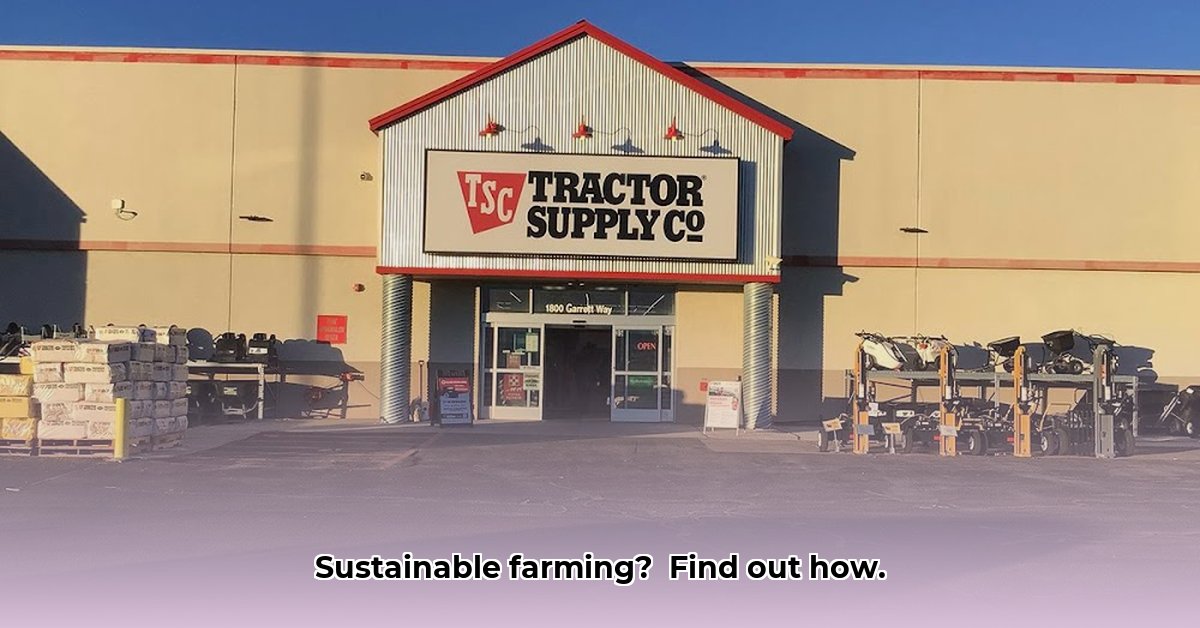
Coeur d'Alene Tractor Supply (TSC) serves as a vital hub for local farmers and gardeners, providing a wide array of products from seeds and fertilizers to larger equipment. However, the extent to which TSC actively supports sustainable agricultural practices requires closer examination. This article analyzes TSC's current offerings and identifies areas for improvement, focusing on the availability of sustainable products and the transparency of their sourcing practices. For example, consider learning more about diatomaceous earth.
Coeur d'Alene Tractor Supply: Assessing Sustainability Efforts
TSC's broad product selection is a significant advantage, catering to the diverse needs of its customer base. This one-stop shop convenience is particularly valuable in rural areas. The helpful staff also provides valuable guidance. However, a critical assessment of TSC's commitment to sustainable agriculture reveals a need for greater transparency and readily available information. Currently, quantifiable data regarding the proportion of organic fertilizers, sourcing practices for animal feed, and prioritization of environmentally conscious suppliers is lacking. This lack of transparency hinders a comprehensive evaluation of their contribution to sustainable farming.
Data Gaps and the Need for Transparency
To accurately gauge TSC's impact on sustainable agriculture, several crucial data points are missing. Specifically:
- Organic Product Percentage: What percentage of TSC's fertilizers and other products are certified organic? This metric is fundamental to understanding their commitment to sustainable alternatives.
- Supply Chain Transparency: What are TSC's sourcing practices for animal feed and other key products? Knowing the origins of these materials is vital for evaluating their environmental and ethical implications.
- Benchmarking Against Competitors: How does TSC's offering of sustainable products compare to other agricultural supply stores? A comparative analysis would provide valuable context.
The absence of this information prevents a robust assessment of TSC's effectiveness in promoting sustainable farming practices.
Recommendations for Enhanced Sustainability
To improve transparency and bolster their commitment to sustainability, TSC should prioritize the following steps:
- Conduct a Comprehensive Environmental Audit: A thorough audit should assess TSC's carbon footprint, waste management, and overall environmental performance, providing concrete data to support their sustainability claims.
- Enhance Online Product Information: TSC's website should be updated to clearly identify sustainable products, allowing consumers to easily filter searches by eco-labels, recycled materials, or other relevant criteria.
- Increase Supply Chain Transparency: Publicly disclosing the sourcing and manufacturing processes for their products will enhance consumer confidence and incentivize sustainable practices throughout their supply chain.
These actionable steps can dramatically improve TSC's ability to support environmentally conscious consumers and contribute to a more sustainable agricultural sector.
The Role of Consumers and Collaborative Action
Consumers play a crucial role in driving change. By actively seeking out and purchasing sustainable products, consumers signal market demand, thereby influencing TSC's product selection and supplier relationships. This consumer-driven approach, combined with stronger environmental regulations and support for local sustainable farms, forms a collaborative effort essential for building a resilient and environmentally responsible agricultural system.
Future Research and Data Collection
To further refine our understanding of TSC's role, future research should include:
- Comparative Analysis: Benchmarking TSC's sustainability performance against competitors in the agricultural supply sector is necessary.
- Sales Data Analysis: Tracking the sales of sustainable versus conventional products will reveal consumer purchasing patterns and the effectiveness of current offerings.
- Stakeholder Interviews: Gathering insights from TSC staff, local farmers, and consumers will provide valuable contextual information.
This multifaceted approach will provide a more complete and nuanced picture of TSC's contribution to sustainable agriculture. Through enhanced transparency, data-driven analysis, and collaborative action, TSC and its customers can work together to build a more sustainable future for farming in the Coeur d'Alene region.